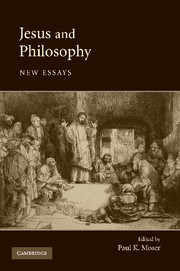Book contents
- Frontmatter
- Contents
- Preface
- Contributors
- Introduction: Jesus and Philosophy
- PART ONE JESUS IN HIS FIRST-CENTURY THOUGHT CONTEXT
- PART TWO JESUS IN MEDIEVAL PHILOSOPHY
- PART THREE JESUS IN CONTEMPORARY PHILOSOPHY
- 7 The Epistemology of Jesus: An Initial Investigation
- 8 Paul Ricoeur: A Biblical Philosopher on Jesus
- 9 Jesus and Forgiveness
- 10 Jesus Christ and the Meaning of Life
- Index
- References
8 - Paul Ricoeur: A Biblical Philosopher on Jesus
Published online by Cambridge University Press: 05 June 2012
- Frontmatter
- Contents
- Preface
- Contributors
- Introduction: Jesus and Philosophy
- PART ONE JESUS IN HIS FIRST-CENTURY THOUGHT CONTEXT
- PART TWO JESUS IN MEDIEVAL PHILOSOPHY
- PART THREE JESUS IN CONTEMPORARY PHILOSOPHY
- 7 The Epistemology of Jesus: An Initial Investigation
- 8 Paul Ricoeur: A Biblical Philosopher on Jesus
- 9 Jesus and Forgiveness
- 10 Jesus Christ and the Meaning of Life
- Index
- References
Summary
In 1979 Paul Ricoeur published a short article, “The Logic of Jesus, the Logic of God.” Paul, in his Letter to the Romans, repeats four times the phrase “how much more” (5:9, 10, 15, 17), and Ricoeur takes Paul's rhetoric to indicate the “divine logic” of Jesus. This is a logic not of equality and equivalence but of the excess and superabundance “that one hears in the voices of the prophets, in Jeremiah, in Ezekiel, and in the Psalms” and also in the teaching of Jesus – as in Matthew 5:39b–42 on turning the other cheek, going the extra mile, and never refusing to lend, or in the extravagance of a parable about the Kingdom of God or the hyperbole of a camel passing through the eye of a needle. Ricoeur goes on to argue that “Paul says the same thing as Jesus but at another level of language” but adds something new:
that Jesus Christ is himself the “how much more of God.” For the Gospel, Jesus was at first the one who spoke and spread the good news. Now he is announced as the one who, by the folly of the cross, breaks the moral equivalence of sin and death…. [T]he church, through the mouth of Paul, gives a name, the name of Jesus Christ, to the law of superabundance. But even then, this proclamation of the church would remain an exclusive saying if we could not attach this supreme “how much more” to the enlightening paradoxes of the rabbi Jesus.
- Type
- Chapter
- Information
- Jesus and PhilosophyNew Essays, pp. 169 - 193Publisher: Cambridge University PressPrint publication year: 2008



